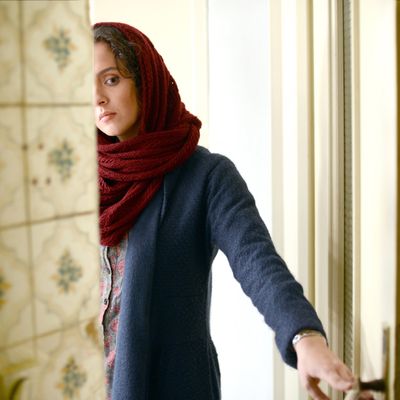
Great news! Because of the imperial presidentÔÇÖs ban on citizens of certain countries entering the United States, audiences are paying a lot more attention ÔÇö and showing up in droves ÔÇö to this yearÔÇÖs Academy AwardÔÇônominated Iranian film The Salesman. ItÔÇÖs unclear if the writer-director, Asghar Farhadi, would be able to attend the ceremony at the end of February and he┬áhas said he wonÔÇÖt even try ÔÇö and why should he? His absence speaks louder than anything he could actually say.
In any case, The Salesman actively promotes the suppression of women and argues on behalf of worldwide jihad. Just kidding! ItÔÇÖs another of the directorÔÇÖs analytical but deeply empathetic films about modern Iranian society and what separates men from women and the government from its people. Obliquely, of course. You canÔÇÖt directly criticize the Iranian regime. You need to move somewhere else, like the U.S. Oops: That oneÔÇÖs off the table.
The background of the movie is a Tehran production of Arthur MillerÔÇÖs Death of a Salesman, but it revolves around a brutal assault on the actress who plays Willy LomanÔÇÖs wife. The woman, Rana (FarhadiÔÇÖs longtime collaborator Taraneh Alidoosti), is washing up in the bathroom of her new apartment in an unfamiliar part of the city when she hears the buzzer from downstairs and thinks itÔÇÖs her husband, Emad (Shahab Hosseini). So she unlocks the door and returns to what she was doing. Bad move. When Emad does get home, he sees blood on the stairs and in the bathroom. He finds Rana in the hospital, where the wounds on her face are being stitched. SheÔÇÖs in shock. She wonÔÇÖt talk about what happened, not then, not a few days later. The nature of the assault, a description of the assailant, the motive ÔÇö itÔÇÖs a blank to be filled by EmadÔÇÖs churning suspicions and fears.
That blank is central to many of FarhadiÔÇÖs films. His Oscar-winning A Separation turns on a woman who tumbles down a staircase, but we donÔÇÖt actually see it. Not knowing what happened broadens and deepens the film. It makes us consider the destructive social forces that helped put that woman on that staircase at that time. In my favorite movie of FarhadiÔÇÖs, About Elly, a young female teacher disappears while visiting colleagues at their beach house. As they learn more about their absent guest, the focus subtly shifts to the trauma of her life ÔÇö and, by implication, the lives of many working single woman in modern Iran. As much as whodunits, Farhadi makes whatdunits and whydunits.
Almost from the beginning of his career, Farhadi has aimed for a middle ground between intimacy and detachment. Sometimes he gets close to his characters, but often it seems as if heÔÇÖs photographing specimens in a terrarium ÔÇö the terrarium in this case a city in which artists have to watch their backs because of hovering censors. The movie begins with the imminent collapse of Rana and EmadÔÇÖs lovely apartment ÔÇö a literal collapse, the result of apparently careless construction next door and a plague of reckless citywide development.
Their new, shabbier apartment ÔÇö rented to them by a member of their company ÔÇö has items belonging to the evicted previous tenant and her small child. (His bike is still there, as are his crayon scribblings on a wall.) That tenant apparently had ÔÇ£clients,ÔÇØ meaning johns, and Emad suspects the person who assaulted his wife might have been one ÔÇö or else was sent by the woman to harass the new tenants. When he finds a set of keys dropped by the attacker and the van parked nearby that they belong to, Emad wants vengeance. So did at least one male viewer I know of.
The inaction in the middle section of The Salesman is excruciating. Rana is impossible to pin down. Her devastation lingers ÔÇö she even insists on showering in her old, condemned apartment ÔÇö but she doesnÔÇÖt want to go to the police. And thereÔÇÖs a broader aspect to the film. Slowly, we begin to see the parallels between her attacker and Death of a Salesman, in which WillyÔÇÖs son learns that his dad is seeing a prostitute. ItÔÇÖs difficult to say any more without giving the long climax away. All I can is that I didnÔÇÖt draw too many breaths during the last half hour.
Several colleagues I respect have expressed discomfort with one aspect of The Salesman: They think thereÔÇÖs an implied condemnation of the unseen prostitute and that Farhadi might be more conservative about womenÔÇÖs sexual freedom than he lets on. IÔÇÖm bound to say that I felt for her and her evicted child. I inferred FarhadiÔÇÖs message to be that in cultures where women are kept under wraps, men have a more difficult time resisting temptation when it appears. They have no practice.
Hosseini ÔÇö who plays a youngish Willy Loman in the stage production ÔÇö makes the fevered Emad an increasingly tragic figure, while AlidoostiÔÇÖs wordless despair gives the movieÔÇÖs final section so much of its power. Farid Sajjadi Hosseini plays an older man who shows up late and all but owns the movie. ÔÇÿNuff said.
Back to that presidential ban, which reads, among other things, ÔÇ£the United States should not admit those who engage in acts of bigotry or hatred (including ÔÇÿhonorÔÇÖ killings, other forms of violence against women, or the persecution of those who practice religions different from their own) or those who would oppress Americans of any race, gender, or sexual orientation.ÔÇØ Sounds good to me! Alas, it does not cover what Harry Shearer on Le Show persists in calling ÔÇ£our freedom-loving friends in Saudi Arabia,ÔÇØ which gave us those freedom-loving 9/11 hijackers. A movie like The Salesman could not be made in Saudi Arabia. Meanwhile, welcoming an artist like Asghar Farhadi with open arms would be a real blow to a repressive fundamentalist regime. Go figure.
*This article appears in the February 6, 2017, issue of New York Magazine.


